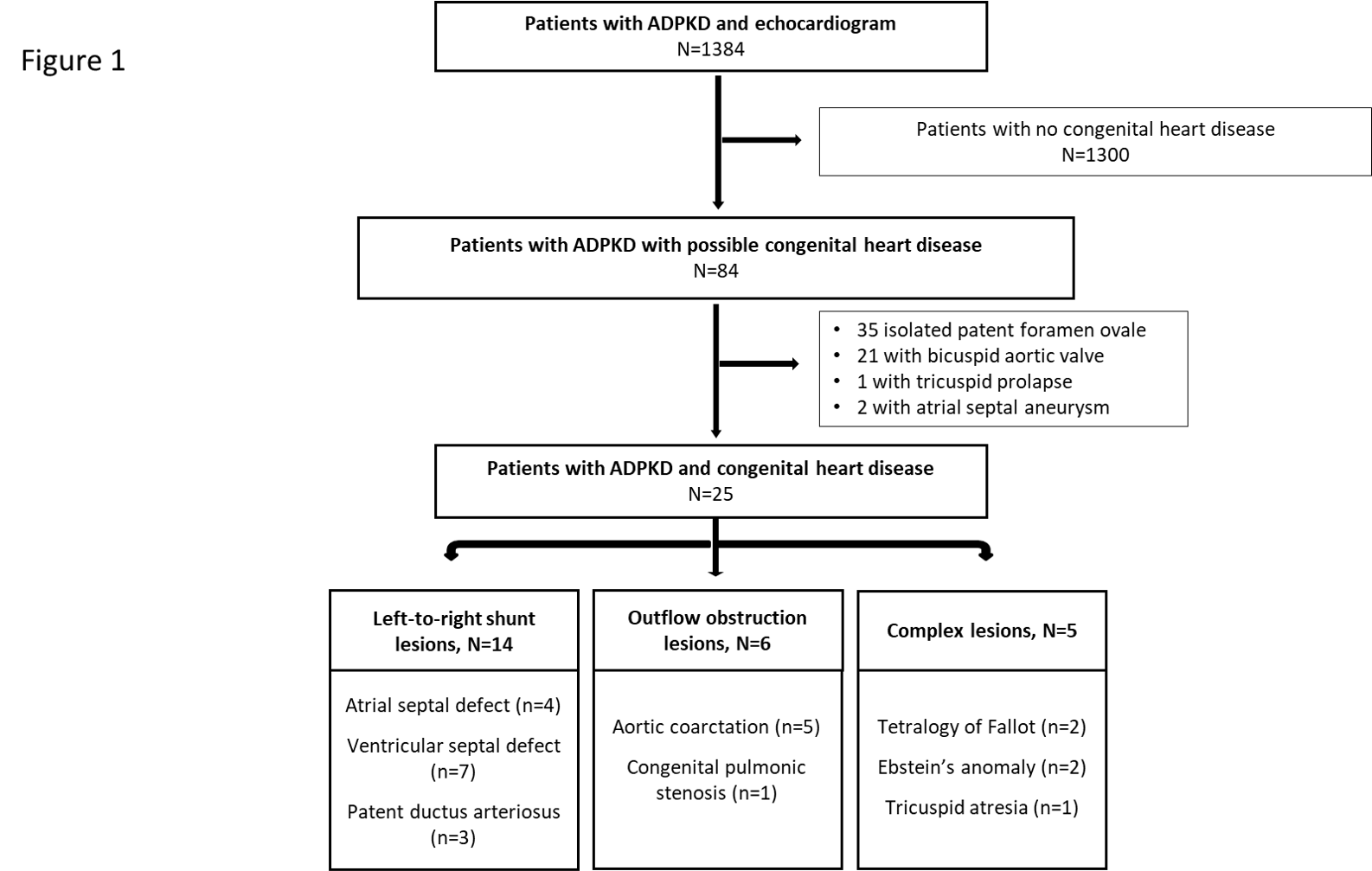Back
Nephrology: Clinical
Category: Abstract Submission
Nephrology III: General Nephrology and Dialysis
52 - Pathogenic variants in PKD1 gene and Congenital Heart Disease in Autosomal Dominant Polycystic Kidney Disease
Sunday, April 24, 2022
3:30 PM – 6:00 PM US MT
Poster Number: 52
Publication Number: 52.340
Publication Number: 52.340
Christian Hanna, Mayo Clinic Children's Center, Rochester, MN, United States; Maroun Chedid, Mayo Clinic Alix School of Medicine, Rochester, MN, United States; Jonathan N. Johnson, Mayo Clinic Children's Center, Rochester, MN, United States; Fouad T. Chebib, Mayo Clinic Alix School of Medicine, Rochester, MN, United States

Christian Hanna, MD, MS
Assistant professor of Pediatrics
Mayo Clinic Children's Center
Mayo Clinic Minnesota
Rochester, Minnesota, United States
Presenting Author(s)
Background: Autosomal dominant polycystic kidney disease (ADPKD) is caused mainly by pathogenic variants in PKD1 or PKD2 encoding the polycystin-1 and -2 proteins. Polycystins have shown to have an essential role in cardiac development and function in animal models.
Objective: In the current study, we describe the clinical association between ADPKD and congenital heart disease (CHD).
Design/Methods: Medical records from Mayo Clinic were queried for all patients with ADPKD and CHD between 1993-2020. CHD was categorized into left-to-right shunt, obstructive, and complex lesions. Patent foramen ovale, mitral valve prolapse, and bicuspid aortic valve anomalies were excluded.
Results: Twenty-five out of 1384 (1.8%) ADPKD patients were identified to have CHD (Figure 1). Of these, 84% were caucasians and 44% males. The median (Q1-Q3) age (years) at CHD diagnosis was 12.0 (2.0-43.5). Fourteen patients (56%) had left-to-right shunt lesions, 6 (24%) had obstructive lesions, and 5 (20%) complex lesions. Seventeen patients (68%) had their defects surgically corrected at a median age of 5.5 (2.0-24.7). Among 13 patients with available genetic testing, 12 (92.3%) had PKD1 pathogenic variants, and none had PKD2. The median age at last follow-up visit was 47.0 (32.0-62.0) and median (Q1-Q3) eGFR was 35.8 (11.4-79.0) mL/min/1.73 m2. Three patients (12%) died; all of them had left-to-right shunt lesions.Conclusion(s): We observed a higher CHD frequency in ADPKD than the general population (1.8 vs. 0.4%). We also suggest that PKD1 pathogenic variants increase the risk for CHD and could be included in the differential diagnosis during evaluation of CHD.
Figure 1. Overview of study flow chart and cohort selection depicting patient exclusions and group assignment based on congenital heart disease subgroups. ADPKD, autosomal dominant polycystic kidney disease; PFO, patent foramen ovale; BAV, bicuspid aortic valve; ASD, atrial septal defect; VSD, Ventricular septal defect; PDA, patent ductus arteriosus.
Overview of study flow chart and cohort selection depicting patient exclusions and group assignment based on congenital heart disease subgroups. ADPKD, autosomal dominant polycystic kidney disease; PFO, patent foramen ovale; BAV, bicuspid aortic valve; ASD, atrial septal defect; VSD, Ventricular septal defect; PDA, patent ductus arteriosus.
Objective: In the current study, we describe the clinical association between ADPKD and congenital heart disease (CHD).
Design/Methods: Medical records from Mayo Clinic were queried for all patients with ADPKD and CHD between 1993-2020. CHD was categorized into left-to-right shunt, obstructive, and complex lesions. Patent foramen ovale, mitral valve prolapse, and bicuspid aortic valve anomalies were excluded.
Results: Twenty-five out of 1384 (1.8%) ADPKD patients were identified to have CHD (Figure 1). Of these, 84% were caucasians and 44% males. The median (Q1-Q3) age (years) at CHD diagnosis was 12.0 (2.0-43.5). Fourteen patients (56%) had left-to-right shunt lesions, 6 (24%) had obstructive lesions, and 5 (20%) complex lesions. Seventeen patients (68%) had their defects surgically corrected at a median age of 5.5 (2.0-24.7). Among 13 patients with available genetic testing, 12 (92.3%) had PKD1 pathogenic variants, and none had PKD2. The median age at last follow-up visit was 47.0 (32.0-62.0) and median (Q1-Q3) eGFR was 35.8 (11.4-79.0) mL/min/1.73 m2. Three patients (12%) died; all of them had left-to-right shunt lesions.Conclusion(s): We observed a higher CHD frequency in ADPKD than the general population (1.8 vs. 0.4%). We also suggest that PKD1 pathogenic variants increase the risk for CHD and could be included in the differential diagnosis during evaluation of CHD.
Figure 1.
 Overview of study flow chart and cohort selection depicting patient exclusions and group assignment based on congenital heart disease subgroups. ADPKD, autosomal dominant polycystic kidney disease; PFO, patent foramen ovale; BAV, bicuspid aortic valve; ASD, atrial septal defect; VSD, Ventricular septal defect; PDA, patent ductus arteriosus.
Overview of study flow chart and cohort selection depicting patient exclusions and group assignment based on congenital heart disease subgroups. ADPKD, autosomal dominant polycystic kidney disease; PFO, patent foramen ovale; BAV, bicuspid aortic valve; ASD, atrial septal defect; VSD, Ventricular septal defect; PDA, patent ductus arteriosus.